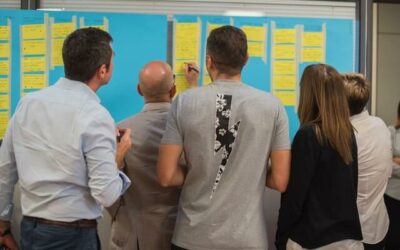I was talking about meaningful work at Marsh & McLennan on 23rd March, when someone asked: do students study what makes work meaningful on their courses, or think about finding meaningful work when they leave university? This is a really important issue because young people entering the workforce now will most likely be working well into their 70s. Imagine spending such a long working life doing work you find meaningless or pointless! It is perhaps especially pertinent to think about this today, which is Mothers’ Day here in the UK, as so many of us have children who will be starting out on their working lives over the coming years. I would certainly want my own children to find work that is meaningful to them.
This term, for the first time, I introduced my final year undergraduate students to the idea of meaningful work, and asked them to use Marjo Lips-Wiersma’s Map of Meaning to think through whether their lives in general, including their studies, their part-time jobs and hobbies enable them to experience meaningfulness. This was the first time they had been encouraged to think through these ideas, and some interesting discussions ensued about how to get a balance of meaningfulness across life domains and over time. There was a general recognition that a lot of the routine, part-time work that students do to support themselves through their studies doesn’t afford much opportunity for meaning. However, such work does act as an enabler of meaning in other life domains, eg studying, hobbies. Some of the students had taken a year’s work experience as part of their course, and they were able to reflect on the extent to which these jobs were meaningful, and to trace back their decision whether to accept a full-time job with that firm after graduation in terms of how meaningful they found the work there.
Many of the students felt that they were spending a great deal of their time experiencing two areas of the framework, unity with others and expressing their full potential, while studying, but that developing the inner self and service to others were taking a bit of a back seat. Some of the students talked about the possibility of engaging in voluntary work through the university as one way to address this gap.
Certainly, though, the students were very taken with the idea that they should look for meaning in their work once they start on their careers, but many thought that meaning might become something they could seek out more proactively once they had gained some initial experience. What struck me from talking with these enthusiastic and ambitious young people was that meaningfulness was not something they had been introduced to elsewhere on their course, or by the careers service, and so perhaps there is a gap here in terms of the advice we are giving school, college or university leavers about the kind of work they should be looking for.
Although some have argued that meaningfulness is the preserve of the older worker, recent research has shown that the top two long term goals for Millennials, Gen X and Baby Boomers, ie the three generations most strongly represented in the workforce today are: making a positive impact on their organisation, and helping solve social or environmental challenges. In fact, it has been found that almost half of workers would take a 15% pay cut to work for an organisation with an inspiring purpose. For many job seekers, meaningful work matters as much as salary. Consequently, meaningfulness is important to everyone, and giving young people the right tools, and the time and space to think through meaningfulness right at the start of their working lives, might be one important service we could do to help the new generation of workers on the path to a satisfying and fulfilling career.




